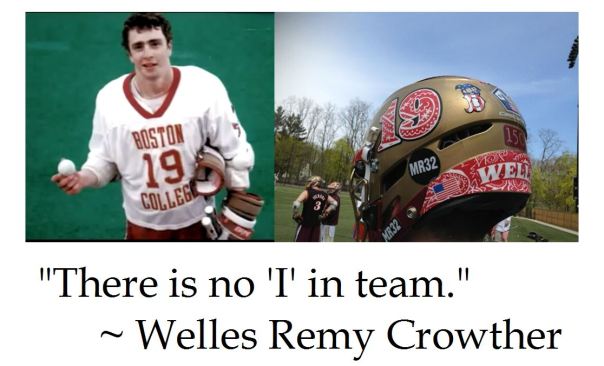While there is nothing new about Welles Remy Crowther's aphorism from his high school yearbook, the way that he put the maxim into action in his life was remarkable.
Welles Crowther was a lacrosse player in secondary school in Nyack New York and later for Boston College's varsity team. Crowther was associated with always wearing a red bandanna, a penchant he acquired as a child. Due to his smaller stature, Crowther was physically overmatched by his competitors, but made it up with enthusiasm and teamwork.
Off the field, Crowther also embodied the heart of a servant. Crowther joined the volunteer Fire Department at age 16. Even after landing a job as a equities trader, Crowther expressed an interest in changing careers to join the New York City Police. In fact, a partially completed application to the NYFD was eventually found in Crowther's apartment
On September 11, 2001, a 24 year old Welles Crowther was at his office on the 104th Floor of the South Tower of the World Trade Center when the first airplane struck the other building. That horrible event prompted him to put his professional pursuits aside and channel teamwork. Crowther was on the 78th floor Sky Lobby of the South Tower when the second plane struck.
Crowther striped to a t-shirt and wore a red bandanna to cover his nose and mouth. Crowther immediately acted as an impromptu team leader to rally the walking wounded to a functioning stairwell. Survivor Judy Wein remembers hearing: "Anyone who can walk, get up and walk now. Anyone who can perhaps help others, find someone who needs help and then head down." Crowther was seen carrying a woman on his back. He led them down to the 61st floor where they were met by First Responders who got them to a functioning elevator on the 40th floor and the rest of the team escaped the towering inferno.
After escorting people down 16 flights of stairs, Crowther ascended the stairwell again to help more "team mates". Crowther's group of First Responders had the "Jaws of Life" and were prepared to lift debris to help trapped victims. According to survivors, Crowther's remains were found with other firemen who were on the 78th floor Sky Lobby when the South Tower collapsed. Crowther's courage and teamwork may have saved a dozen lives.
Crowther's story might have been lost in the alluvia of fragmented memories of 9/11. But six months after the atrocity, the New York Times published an account from a survivor who remembered a detail about a mysterious man with a red handkerchief organizing a makeshift triage. This red bandanna memory gave Crowther's grieving parents some solace about their son, simultaneously providing closure and confirmation of their son's solid character.
In 2006, Welles Crowther was posthumously named an honorary New York Fire Fighter for being a 9/11 Angel. Boston College sponsors an annual Red Bandanna Run for the Welles Crowther Trust. The American Heroes Channel will soon award an Inaugral "Red Bandanna Award" for exemplifying the American spirit during a nationally televised Boston College football game on September 18th.
So often, sports can become base, reduced to a boxscore, vexing whether the home team will make the playoffs or speculating about the latest New England Patriots scandal. But sports can be much more than those pedestrian pastimes.
As we reflect on the anniversary of 9/11, Welles Crowther's exemplary life shows the deep values that can be derived by sports. Welles Crowther's dedication to teamwork was cultivated by coaching on the field but was inculcated into his life. Crowther not only thought of others at a tragic time, but was conditioned to rally and help "team mates" at a test match of life.
While the cynical may smirk at the truism that "There is no 'I' in team", Welles put that principle into practice sacrificing his life for the sake of others. Those are the virtues which make sports meaningful.
h/t: ESPN
[This piece originally ran on DC-Jockularity]



No comments:
Post a Comment